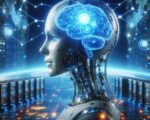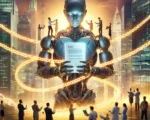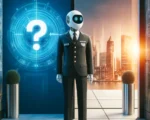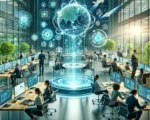
The headline of this article as well as the text that follows the dotted line afterwards are fully written by ChatGPT (using GPT-4).
I merely asked the AI the following: “Imagine you are a columnist for New York Times. Write an opinion article on what jobs humans can do that AI cannot in the future”.
I then asked it to convert some words into British spelling and broke up some of the longer paragraphs. Other than that, the text below is entirely produced by AI.
For a commentary on this piece, read my opinion article here. Yes, that one is fully written by me, so I hope you can spot the difference!
……………………………………….
As the world continues to advance in technology, with artificial intelligence (AI) becoming increasingly sophisticated, there is growing concern about the impact of automation on human employment.
Many fear that AI will render human labour obsolete, as machines are able to perform tasks with greater efficiency and accuracy. However, amidst this technological revolution, there are certain jobs that require the unique capabilities and nuances of the human touch, which AI simply cannot replicate.
One of the indispensable qualities of humans is our ability to empathise and connect with others on an emotional level. Jobs that require deep emotional intelligence and human interaction, such as therapy, counselling, and social work, will continue to be vital in the future.
While AI may be able to provide information and advice, it lacks the ability to truly understand and empathise with human emotions, experiences, and struggles. The human capacity for empathy and compassion is a cornerstone of these professions, enabling individuals to offer comfort, support, and guidance to those in need.
Creativity and innovation are also uniquely human traits that cannot be replicated by AI. Jobs in fields such as art, music, writing, and design require imagination, intuition, and subjective decision-making that go beyond the capabilities of AI.
While AI can analyse patterns and generate content based on existing data, it lacks the ability to truly think outside the box, challenge norms, and produce original ideas that reflect the complexities of human emotions and experiences. The human ability to interpret the world through a unique lens and express oneself creatively is a gift that cannot be replicated by machines.
Furthermore, jobs that require complex problem-solving, critical thinking, and decision-making in unpredictable situations, such as emergency response, crisis management, and strategic planning, will always rely on human judgement.
AI relies on data and algorithms, and while it can process vast amounts of information quickly, it lacks the ability to interpret context, apply subjective reasoning, and make nuanced decisions based on ethical considerations.
Humans, on the other hand, possess the capacity to analyse complex situations, weigh multiple factors, and make informed decisions that take into account the broader implications and consequences.
Jobs that require physical dexterity and fine motor skills, such as surgery, craftsmanship, and fine arts, are also areas where humans excel. Despite advances in robotic surgery, there are still limitations to the precision and adaptability of machines in delicate and intricate tasks.
Human touch, sensory perception, and motor skills are unparalleled in their ability to perform intricate tasks that require precision and attention to detail.
In addition, human-to-human interactions in various service industries, such as hospitality, customer service, and sales, will continue to be in demand.
AI may automate certain aspects of these jobs, but the human touch in providing personalised service, building relationships, and understanding customer needs and preferences cannot be replicated by machines.
The human capacity for emotional connection and social skills are invaluable in these professions, enabling individuals to build trust, provide empathy, and offer tailored solutions.
As we navigate the ever-evolving landscape of technological advancements, it is important to recognise and embrace the unique qualities that make us human.
While AI has the potential to streamline processes and improve efficiencies, there are intrinsic human qualities that cannot be replicated by machines.
Jobs that require emotional intelligence, creativity, complex problem-solving, physical dexterity, and human-to-human interactions will always be in demand.
It is crucial to invest in education and training that cultivate these uniquely human skills, and to recognise the value and indispensability of the human touch in the workforce of the future.
In conclusion, while the rise of AI may transform the job market, there are certain jobs that AI cannot fully replace. The human capacity for empathy, creativity, critical thinking, decision-making, physical dexterity, and social skills are indispensable.















